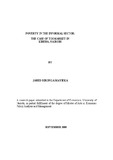| dc.description.abstract | This study set out to examine poverty in the informal sector. The study used
descriptive and analytical techniques on data from 60 entrepreneurs
differentiated by five business types, namely metal works, wood works,
textiles, leather works and hawking in Kibera, Nairobi.
The study used descriptive and analytical techniques on primary data
collected using the interview and questionnaire method from 60
entrepreneurs of Toi market in Kibera, Nairobi
The main findings of this study are that more than half of the entrepreneurs
in the informal sector live below the absolute poverty line of Kshs 2,646.
There is also evidence that poverty is more pronounced among male than
female entrepreneurs in the sector.
The study also found out that one of the major limitations this sector is
facing is the limited access to credit and this hinders the expansion and
profitability of the business and consequently a reduction in poverty within
the sector.
This paper has therefore recommended more support and formulation of
policies that will provide an enabling environment for the growth of the
sector, bring about order in the sector and eventual integration into the
formal sector. | en |

